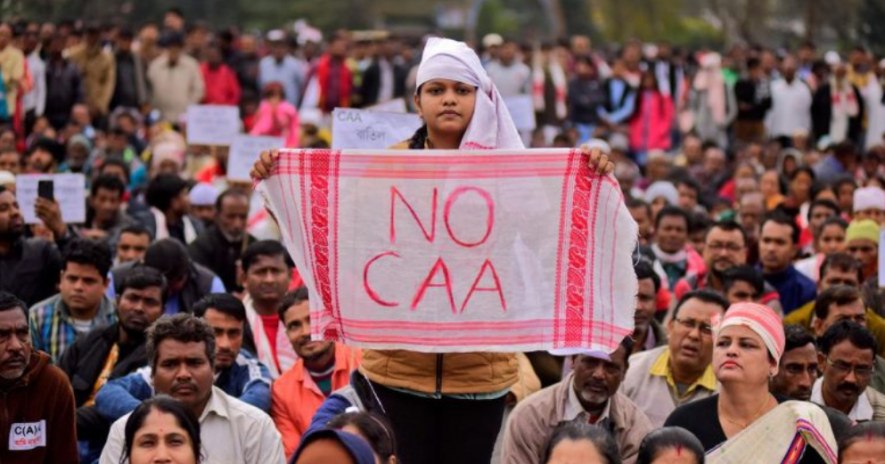Disha Tandon, Pune
Assam is witnessing a resurgence of protests against the Citizenship (Amendment) Act (CAA) after a four-year hiatus, signaling a revived conflict between the state’s opposition and the central government. This revival comes in the wake of Union Home Minister Amit Shah’s announcement about the forthcoming enforcement of CAA rules before the Lok Sabha elections, reigniting concerns over the controversial act that sparked widespread demonstrations in December 2019.
The initial protests saw the Krishak Mukti Sangram Samiti (KMSS) and its student wing, the Satra Mukti Sangram Samiti (SMSS), taking to the streets in Dhubri, Tinsukia, and Hailakandi districts. Activists raised anti-CAA slogans, leading to the detention of ten individuals. While some were subsequently released, the incident highlighted the administration’s stern stance against the protestors and underscored the deep-rooted tensions surrounding the CAA’s implementation.
In a significant development, leaders from sixteen anti-BJP parties convened to address the issue, presenting a memorandum to President Droupadi Murmu through the Governor. The memorandum appealed for the Centre to halt the CAA’s implementation, citing its potential to undermine the Assam Accord of 1985, which is central to preserving the state’s demographic and cultural integrity. The opposition’s concerted effort reflects a broad consensus against the CAA, viewing it as a threat to Assam’s identity and social fabric.
Responding to the opposition’s movements, Assam’s Director General of Police (DGP), G. P. Singh, warned against the economic repercussions of mass agitation, referencing a Gauhati High Court order that quantified the potential losses from such protests. This stance was echoed by Chief Minister Himanta Biswa Sarma, who downplayed the relevance of protests against the CAA and suggested that those opposed to the act could seek redress from the Supreme Court. Sarma’s comments underline the government’s position that the judiciary, rather than street protests, should be the arena for contesting the CAA’s legality.
The opposition’s memorandum to the President articulated concerns that the CAA contravenes the Assam Accord by altering the cutoff date for recognizing immigrants, thereby impacting the state’s demographic balance and cultural identity. The Act facilitates citizenship for minority immigrants from neighboring countries up to December 31, 2014, a provision seen as diluting the Accord’s stipulations and stoking fears of cultural and demographic dilution.
The political landscape in Assam is charged with the anticipation of further mobilization against the CAA. The All Assam Students’ Union (AASU) and thirty allied groups have announced plans for a series of agitational programs, including a hunger strike, to coincide with Prime Minister Narendra Modi’s visit to the state. This reflects the depth of opposition to the CAA and signals the potential for a widespread movement.
As Assam stands on the brink of another wave of protests, the opposition’s strategy appears twofold: seeking judicial intervention while preparing for mass agitation. The state’s history of contentious political mobilization, particularly around issues of identity and citizenship, suggests that the coming months could see intensified opposition to the CAA. With the Lok Sabha elections on the horizon, the act’s implementation has emerged as a flashpoint, potentially shaping the political discourse and electoral outcomes in Assam.
The coming period will be critical in determining the trajectory of the CAA’s implementation and the opposition’s response. As the state grapples with these contentious issues, the central and state governments, opposition parties, civil society, and citizens of Assam are poised at a crossroads that will define the state’s future direction and its place within the broader tapestry of India’s democratic and pluralistic society.
